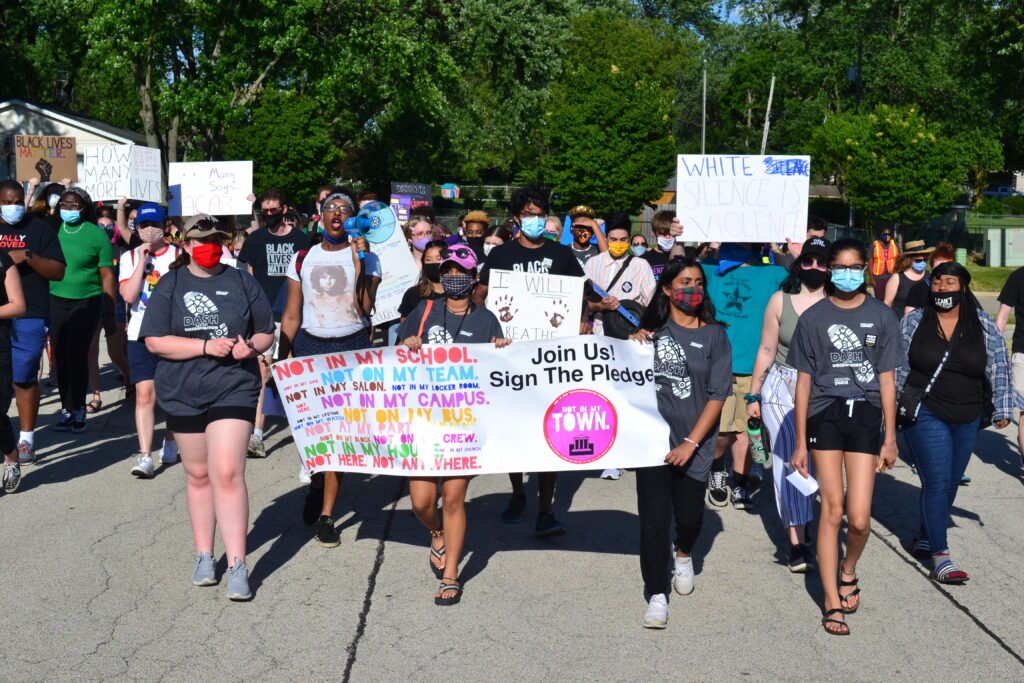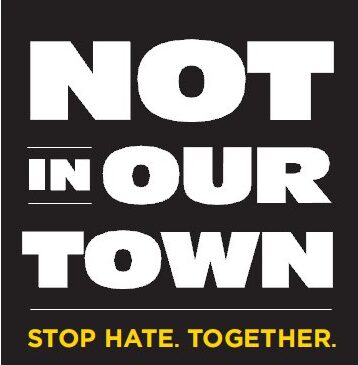Q&A with Mike Matejka, volunteer, Not In Our Town
The Project…
Bloomington-Normal Social Justice Tours
Location: Bloomington-Normal, Illinois
Bloomington-Normal Social Justice Tours is a 26-year-old volunteer, community effort to stop hate, address bullying, and build a safe, inclusive community.

The Organization…
 Not In Our Town
Not In Our Town
Not In Our Town is a coalition of partners that aims to build deeper understanding of sociological and historical issues, and use the arts to communicate human situations. Partners include the NAACP, Prairie Pride Coalition, Connexion Latina, McLean County Museum of History, Moms Demand Action, and multiple religious congregations, local media, and city government.
Follow @niotbn: Website | Facebook
NIOT in the News:
- The 1995 PBS “Not In Our Town” film that launched a movement
- National NIOT website — Bloomington-Normal, 25 years
- National NIOT website – Bloomington-Normal stands up to hate, 2020, video
The Q&A…
Q1: How do you see the arts/culture/humanities as being essential?
 Mike Matejka: The humanities ground us as a human community. By sharing our stories, songs and history, we do more than entertain — we enrich our knowledge about who we are, both as individuals and as a diverse people. Without cultural expression and shared knowledge, we would suffer national amnesia. Understanding each other and our roots is a path forward to a more just and equitable society.
Mike Matejka: The humanities ground us as a human community. By sharing our stories, songs and history, we do more than entertain — we enrich our knowledge about who we are, both as individuals and as a diverse people. Without cultural expression and shared knowledge, we would suffer national amnesia. Understanding each other and our roots is a path forward to a more just and equitable society.
Q2: What is the most important thing people should know about your work?
Mike Matejka: Since 1995, Not In Our Town Bloomington-Normal has built bridges to recognize and celebrate our diversity. Our purpose is to “stop hate, address bullying and build a safe, inclusive community.” NIOT has sponsored seminars, marches, community forums, cultural celebrations and includes an active “Not In Our School” program where our youth identify their concerns and work to create safe and wholesome educational environments. In McLean County NIOT is a well known, volunteer organization that actively seeks to partner and recognize our various communities and build common understanding.
Q3: Who makes your work possible?
Mike Matejka: Since 1995, Not In Our Town has been all volunteer. We have a diverse steering committee and active volunteers who have sustained this effort for over 25 years. We seek to build a positive, community climate and are also responsive when an incident occurs for people to come together to dialogue and heal. Partnerships with the NAACP, the public schools. Moses Montefiore Temple, our local Muslim and Hindu communities and the McLean County Museum of History allow for a broad reach to multiple constituencies.
Anything else you’d like to add?
Mike Matejka: We appreciate the [Illinois Humanities] funding for our current project; for over 15 years we’ve done “social justice history walking tours” with the McLean County Museum of History, sharing stories of human rights efforts by actually walking to where those events happened. This has never been documented, so the IHC grant is helping us and the McLean County Museum of History mark these sites and do appropriate background research.
About The Illinois Humanities Grantee Partner Spotlight
Illinois Humanities highlights the work of our Community Grants program partners through our “Grantee Spotlight.” It shines the light on our grantee partner’s work, offering details about the organization and the funded project, as well as a Q&A with a team member at the organization. More: ILHumanities.org/Spotlight
About Illinois Humanities
Illinois Humanities, the Illinois affiliate of the National Endowment for the Humanities, is a statewide nonprofit organization that activates the humanities through free public programs, grants, and educational opportunities that foster reflection, spark conversation, build community and strengthen civic engagement. We provide free, high-quality humanities experiences throughout Illinois, particularly for communities of color, individuals living on low incomes, counties and towns in rural areas, small arts and cultural organizations, and communities highly impacted by mass incarceration. Founded in 1974, Illinois Humanities is supported by state, federal, and private funds.
Learn more at ilhumanities.org and on Facebook, Twitter, Instagram, and LinkedIn @ILHumanities.